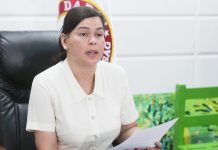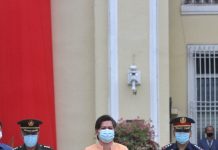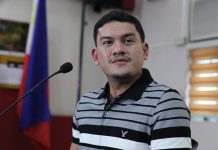It was Sunday morning when Babu Kandi, 48, returning from her market day routine in Carmen, North Cotabato, arrived in their village of Barangay Simone, Kabacan, and saw her neighbors in the process of evacuating. Her conditioned reflex took over instantly and, without missing a step, she found herself heading for the Pulangi riverbank where a pumpboat was taking on a load of frantic villagers. Babu Kandi hastily went aboard and the boat was soon making its way downstream towards another village where the evacuees hoped they would be safe.
“Walay pili ang bala (A bullet doesn’t choose its target),” she told reporters last May 29 during their visit to the barangay in the company of Governor Emmylou “Lala” Taliño-Mendoza.
That was not the first time that Babu Kandi was an evacuee. “Sanay na kami sa giyera (We’re used to war. We grew up here),” she said. Even before she got married, Kandi had been a bakwit (evacuee) since 1970. On that very day, she already had eight children and four grandchildren.
“Wala na kaming mabuting kabuhayan (We don’t have a decent livelihood anymore),” she said, adding that her husband is only a carpenter.
Although she had survived countless evacuations, she admits to being scared by the sound of gunfire. “Siyempre matakot ako kung makarinig ng putok.”
“Kapayapaan ang gusto namin. Napagod na kami sa pagbakwit, yung iba nga namatay na sa bakwitan (We long for peace. We’re tired of evacuating. Some evacuees have died in evacuation centers.),” she shared.
Land conflict
Recently, Mendoza was asked by the Provincial Disaster Risk Management Council (PDRRMC) to act on the reason behind the armed conflict in the barangays of Simone and Nangaan.
Caused reportedly by land conflict, the war started early January this year between members of the Moro Islamic Liberation Front (MILF) of Barangay Simone, and elements of the Moro National Liberation Front (MNLF) of Barangay Nangaan which resulted in one death and injury to another and the displacement of some 10,000 innocent civilians. It was only one of a series of armed encounters between the warring groups.
Internally displaced persons (IDPs) have fled to neighboring barangays of Lanoon and Pebpoluan in Carmen, and to nine barangays of Kabacan town.
Relief operations were jointly conducted by the provincial government of Cotabato, the LGUs of Kabacan and Carmen, the International Committee of the Red Cross and the Philippine National Red Cross, Department of Social Welfare and Development 12, Integrated Provincial Health Office/Rural Health Unit and the Mindanao Children’s Library.
Mendoza said that there had been no operation by the military, adding, “We can’t take sides.”
The only interventions that the Armed Forces of the Philippines (AFP) did was to return the evacuees to their homes, and restore peace and order by setting up checkpoints to avoid reinforcements from either of the warring groups.
“Naundang ang giyera kay nahurot ilang bala, the shooting stopped when both sides ran out of ammunition, thanks to the military checkpoints,” Mendoza said.
Local initiatives
One of the initiatives of the provincial government, Mendoza said, was to campaign among the people that everyone should respect someone else’s property. “If the crops are not yours, don’t harvest them. If the land is not yours, don’t grab it,” was her advice.
Another peace initiative that Mendoza’s office conducted was the two-month province-wide summer camp, dubbed First Governor Lala Kids Summer Peace Camp, which was launched last April 4.
Participated in by some 28,000 delegates and volunteers, it aimed to enhance the leadership skills of young learners and teach them survival skills and provide them inputs on child’s rights and environment preservation, particularly on solid waste management.
It was to establish a good relationship between Muslim, Lumad and Christian kids to become role models of harmonious co-existence in society, Mendoza said.
With a counterpart scheme, the program was funded by the LGUs, provincial government’s Special Education Fund and the Maintenance and Other Operating Expenses of the Department of Education.
While the national government continues its peace negotiations and talks with armed groups and revolutionary forces, the provincial government has undertaken several peace and development initiatives to ensure economic progress in North Cotabato.
These include road rehabilitation and construction; Kabalikat PALMA Infrastructure Project; P11.3 million worth of projects components implemented in peace and development communities under Acts of Peace; construction of new public school buildings, and nine classrooms in Gokotan and Bualan, Pikit.
Consultation and dialogues were conducted long with municipal and barangay visitations; discussions on on peace and development with MNLF chairman Nur Misuari; and with local leaders in Pres. Roxas town.
Campaigns were also initiated against terrorism; carnapping; kidnapping; illegal gambling and drugs; and, loose firearms and explosives. The Anti-Crime Task Group hotelines were launched upon the issuance of an executive order creating the North Cotabato Anti-Crime Task Group.
An electrification program was implemented in Barangay Nasapian, Carmen worth P2.8 million and improvement of health facilities, as well as upgrading of hospitals with a total project cost of P5.275 million.
“Pag naay conflict, tagai kog interventions, such as education, roads for relief, and justices. Walay magrebelde tungod pobre. Naay nagarebelde tungod walay hustisya,” Mendoza said.






